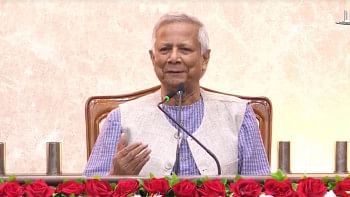Embrace quantum technology and AI for global competitiveness

Bangladesh must harness the potential of quantum technology and artificial intelligence (AI) to ensure cost-effectiveness and remain competitive in an increasingly interconnected world, said Sam Samdani, interim chief executive officer of QuantumCT and external adviser to American consulting firm McKinsey & Company.
Speaking at a lecture titled "Leveraging Quantum Phenomena: Reimagining a New World", organised by the Metropolitan Chamber of Commerce and Industry (MCCI) at the Anis Ud Dowla Conference Hall in the capital yesterday, Samdani called for greater focus on foundational sciences to prepare for the technological revolution.
This is the best time to be alive. AI helps us learn faster, better, and in more detail. It is no longer necessary to master English to access knowledge. AI makes learning available native languages.
"The world is connected now. So, work done in Bangladesh can be useful in other countries and developments in other places can also help in Bangladesh," he said.
"Our students and business executives must be equipped to understand foundational sciences like quantum physics and find ways to apply them in real-world contexts."
Samdani emphasised that quantum physics opens the doors to innovation across sectors. Drawing attention to existing breakthroughs like lasers and magnetic resonance imaging (MRI), he urged students and researchers to explore the "strange phenomena" of quantum effects and repurpose them for local applications.
For instance, he mentioned the potential of quantum-based sensors to revolutionise medical imaging with unprecedented resolution, enabling early detection of diseases.
Some of these advancements are already in late-stage development and could hit the market within the next few years, he noted.
According to him, Bangladesh needs a talent pipeline that is well-versed in quantum physics, mathematics, and AI to leverage these technologies effectively.
Samdani also emphasised the importance of nurturing curiosity among young students and fostering a culture of learning.
"This is the best time to be alive. AI helps us learn faster, better, and in more detail," he said. "It is no longer necessary to master English to access knowledge. AI makes learning available in Bangla and other native languages."
Samdani underscored that investing in a mindset change is key to advancing these technologies. He suggested businesses focus on partnerships with global firms to adopt and adapt advanced technologies for local needs.
Citing examples of cost-effective adaptations, Samdani said technologies like MRI machines, which are often expensive in their original form, can be modified to create affordable versions suitable for developing countries.
"Quantum physics, AI, and biotechnology are converging fields that offer immense opportunities for creativity and innovation," he added.
Samdani urged the government to prioritise "knowledge diplomacy" by creating platforms for information exchange and collaboration.
He proposed establishing an online clearing house for quantum technologies, potentially hosted by institutions like the Bangladesh Council of Scientific and Industrial Research.
"Knowledge diplomacy will be the soft power of the future, more impactful than traditional arms diplomacy," he remarked.
Addressing the event, M Tamim, vice-chancellor of Independent University, Bangladesh, remarked on the human brain's difficulty in comprehending quantum phenomena, such as particles existing in two places simultaneously.
Despite this complexity, quantum physics is now being applied to computing and communication, he said.
However, Tamim raised ethical concerns, such as cloning and the blending of physical and digital realms, which are already emerging globally.
He noted that Bangladesh lags behind in adopting cutting-edge technology and highlighted the energy-intensive nature of quantum computing and AI.
He emphasised that universities must prepare students to tackle these challenges and take the lead in advancing such transformative technologies.
The event was also addressed by M Asis Ud Dowla, former president of MCCI, Kamran T Rahman, president of MCCI, Habibullah N Karim, senior vice-president of MCCI, and Farooq Ahmed, secretary general of MCCI.

 For all latest news, follow The Daily Star's Google News channel.
For all latest news, follow The Daily Star's Google News channel. 



Comments